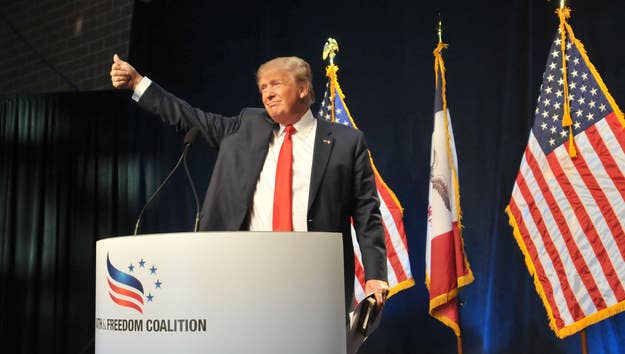
In his 1990 book Surviving at the Top, Donald Trump proposed giving constitutional authority to negotiate trade deals to an economic council comprised of a smorgasbord of top business leaders from the 1990s.
"I think America should call on its corporate leaders, independent dealmakers, and other nonpolitical public figures who emerged during the past two decades to help us forge a new relationship with the rest of the world," wrote Trump. "I'm suggesting that these people form a kind of all-star panel that would oversee America's negotiations with Japan, Europe, and other areas needing special attention. The blue-ribbon volunteers would be vested with as much authority as our Constitution would permit."
Trump's proposed members to run this powerful commission were a who's who in the 1990s' business world, including names like Jack Welch of General Electric, Disney's Michael Eisner, and CNN's Ted Turner.
Trump said if he was on the council, he'd put a 20% tariff on Japanese and German goods and "other countries that don't play by the rules," saying that the money could be used to pay down the national debt.
"If I were selected to serve on this council, I know the first thing I'd propose: the imposition of a 20 percent tax on imports from Japan, German, and other countries that don't play by the rules," Trump wrote. "That money - which would amount to billions of dollars - could reduce the federal deficit and pay for education, housing, and medical care in poor areas throughout America. So what if the Japanese slapped a tax on us in response? The fact is, the effect would be negligible because we buy a whole lot more from the Japanese than we sell them."
Here's the full passage from the book:
In the era since the Vietnam war we have witnessed the rise of a generation of driven, intense, and sometimes ruthless individual who came out college and totally rewrote the rules of doing business in this country. Yet in our dealings with the rest of the world we've to often become a bunch of suckers.
That's why I'm now making a modest proposal.
I think America should call on its corporate leaders, independent dealmakers, and other nonpolitical public figures who emerged during the past two decades to help us forge a new relationship with the rest of the world. I'm suggesting that these people form a kind of all-star panel that would oversee America's negotiations with Japan, Europe, and other areas needing special attention. The blue-ribbon volunteers would be vested with as much authority as our Constitution would permit.
Listed below are some of the people I'd choose for this job. I have watched them work, and in some cases I've negotiated with them one-on-one. I can assure you that, if given a free rein, they could reverse America's eroding economic status and enhance our country's stature as a role model for the rest of the world in a matter of months.
Jack Welch, of General Electric
Henry Kravis of Kohlberg Kravis Roberts, the country's leading practitioner of leveraged buyouts
Steve Ross of Time Warner
Martin Davis, chairman of Paramount Communications
Bob or Sid Bass, investors extraordinaires
Michael Eisner, CEO of Disney
Ron Perelman, another LBO wizard, who owns Revlon
Ted Turner, the broadcaster
Carl Icahn, the boss of TWA
If I were selected to serve on this council, I know the first thing I'd propose: the imposition of a 20 percent tax on imports from Japan, German, and other countries that don't play by the rules. That money - which would amount to billions of dollars - could reduce the federal deficit and pay for education, housing, and medical care in poor areas throughout America. So what if the Japanese slapped a tax on us in response? The fact is, the effect would be negligible because we buy a whole lot more from the Japanese than we sell them.
Even as I write this, I can hear the howls of protest from the foreign businessmen who'd be affected - and can see them pounding on the doors of senators and congressmen, demanding to be heard. But I wouldn't feel pressured by those tactics, as the politicians involved no doubt would. Rather, I would take that strong reaction as an indication that I'd done the right thing.

